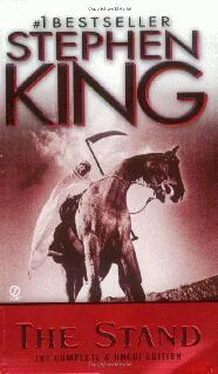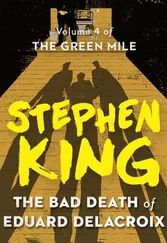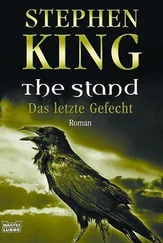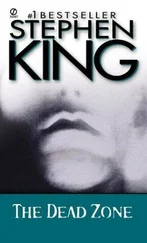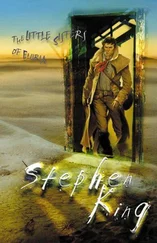Stu woke up when Tom eased him down.
“Sorry,” Tom said apologetically. “I had to rest my arms.” He first twirled, then flexed them.
“You rest all you want,” Stu said. “Slow and easy wins the race.” His head was thudding. He found the Anacin and dry-swallowed two of them. It felt as if his throat had been lined with sandpaper and some sadistic soul was striking matches on it. He checked the sleeping bag seams. As he had expected, they were coming unraveled, but it wasn’t too bad yet. They were on a long, gradual upslope, exactly the sort of thing he had been looking for. On a slope like this, better than two miles long, a car with the clutch disengaged could get cruising along pretty good. You could try to pop-start it in second, maybe even third gear.
He looked longingly to the left, where a plum-colored Triumph was parked askew in the breakdown lane. Something skeletal in a bright woolen sweater leaned behind the wheel. The Triumph would have a manual transmission, but there was no way in God’s world that he could get his splinted leg into that small cabin.
“How far have we come?” he asked Tom, but Tom could only shrug. It had been quite a piece, anyway, Stu thought. Tom had pulled him for at least three hours before stopping to rest. It spoke of phenomenal strength. The old landmarks were gone in the distance. Tom, who was built like a young bull, had dragged him maybe six or eight miles while he dozed. “You rest all you want,” he repeated. “Don’t knock yourself out.”
“Tom’s okay. O-and-K, that spells okay, laws, yes, everybody knows that.”
Tom wolfed a huge lunch, and Stu managed to eat a little. Then they went on. The road continued to curve upward, and Stu began to realize it had to be this hill. If they crested it without finding the right car, it would take them another two hours to get to the next one. Then dark. Rain or snow, from the look of the sky. A nice cold night out in the wet. And goodbye, Stu Redman.
They came up to a Chevrolet sedan.
“Stop,” he croaked, and Tom set the travois down. “Go over and look in that car. Count the pedals on the floor. Tell me if there’s two or three.”
Tom trotted over and opened the car door. A mummy in a flowered print dress fell out like someone’s bad joke. Her purse fell out beside her, scattering cosmetics, tissues, and money.
“Two,” Tom called back to Stu.
“Okay. We got to go on.”
Tom came back, took a deep breath, and grabbed the handles of the travois. A quarter of a mile farther along, they came to a VW van.
“Want me to count the pedals?” Tom asked.
“No, not this time.” The van was standing on three flats.
He began to think they were not going to find it; their luck was simply not in. They came to a station wagon that had only one flat shoe, it could be changed, but like the Chevy sedan, Tom reported it only had two pedals. That meant it was an automatic, and that meant it was useless to them. They pushed on. The long hill was flattening out now, beginning to crest. Stu could see one more car ahead, one last chance. Stu’s heart sank. It was a very old Plymouth, a 1970 at best. For a wonder it was standing on four inflated tires, but it was rust-eaten and battered. Nobody had ever bothered with much in the way of maintenance on this heap; Stu knew its sort well enough from Arnette. The battery would be old and probably cracked, the oil would be blacker than midnight in a mineshaft, but there would be a pink fuzz runner around the steering wheel and maybe a stuffed poodle with rhinestone eyes and a noddy head on the back shelf.
“Want me to check?” Tom asked.
“Yeah, I guess so. Beggars can’t be choosers, can they?” A fine cold mist was starting to drift down from the sky.
Tom crossed the road and looked inside the car, which was empty. Stu lay shivering inside the sleeping bag. At last Tom came back.
“Three pedals,” he said.
Stu tried to think it out. That high, sweet-sour buzzing in his head kept trying to get in the way.
The old Plymouth was almost surely a loser. They could go on over to the other side of the hill, but then all the cars would be pointing the wrong way, uphill, unless they crossed the median strip… which was a rocky half-mile wide here. Maybe they could manage to find a standard shift car on the other side… but by then it would be dark.
“Tom, help me get up.”
Somehow Tom helped him to his foot without hurting his broken leg too badly. His head thumped and buzzed. Black comets shot across his field of vision and he nearly passed out. Then he had one arm around Tom’s neck.
“Rest,” he muttered. “Rest…”
He had no idea how long they stood that way, Tom supporting him patiently as he swam around in the gray half-tones of semiconsciousness. When the world finally came back, Tom was still patiently supporting him. The mist had thickened to a slow, cold drizzle.
“Tom, help me across to it.”
Tom put an arm around Stu’s waist and the two of them staggered across to where the old Plymouth stood in the breakdown lane.
“Hood release,” Stu muttered, fumbling in the Plymouth’s grille. Sweat rolled down his face. Shudders wracked him. He found the hood release but couldn’t pull it up. He guided Tom’s hands to it and at last the hood swung up.
The engine was about what Stu had expected—a dirty and indifferently maintained V8. But the battery wasn’t as bad as he had feared it would be. It was a Sears, not the top of the line, but the guarantee-punch was February of 1991. Struggling against the feverish rush of his thoughts, Stu counted backward and guessed that the battery had been new last May.
“Go try the horn,” he told Tom, and propped himself against the car while Tom leaned in to do it. He had heard of drowning men grasping at straws, and he guessed that now he understood. His last chance of surviving this was a rattletrap junkyard refugee.
The horn gave a loud honk. Okay then. If there was a key, take the shot. Probably he should have had Tom check that first, but on second thought, it didn’t much matter. If there was no key, they were most likely all through no matter what.
He got the hood down and latched by leaning all off his weight on it. Then he hopped around to the driver’s door and stared in, fully expecting to see an empty ignition slot. But the keys were there, dangling from an imitation leather case with the initials A.C. on it. Bending in carefully, he turned the key over to accessory. Slowly, the gas gauge needle swung over to a little more than a quarter of a tank. Here was a mystery. Why had the car’s owner, why had A.C. pulled over to walk when he could have driven?
In his light-headed state, Stu thought of Charles Campion, almost dead, driving into Hap’s pumps. Old A.C. had the superflu, had it bad. Final stages. He pulls over, shuts off his car’s engine—not because he’s thinking about it, but because it’s a long-ingrained habit—and gets out. He’s delirious, maybe hallucinating. He stumbles out into the Utah badlands, laughing and singing and muttering and cackling, and dies there. Four months later Stu Redman and Tom Cullen happen along, and the keys are in the car, and the battery’s relatively fresh, and there’s gas—
The hand of God .
Wasn’t that what Tom had said about Vegas? The hand of God came down out of the sky . And maybe God had left this battered ‘70 Plymouth here for them, like manna in the desert. It was a crazy idea, but no more crazy than the idea of a hundred-year-old black woman leading a bunch of refugee into the promised land.
“And she still made her own biscuits,” he croaked. “Right up until the very end, she still made her own biscuits.”
“What, Stu?”
Читать дальше
